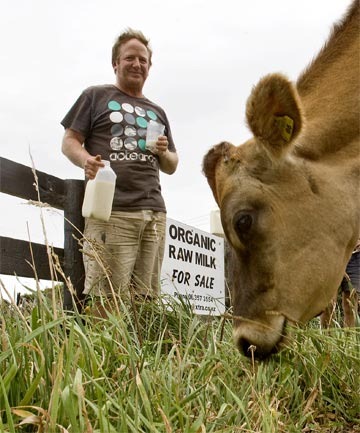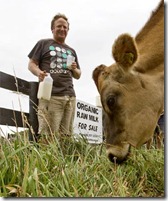OPINION: Fonterra’s decision to slash its organic milk collection should concern all its suppliers. It was handled badly, with little regard for the feelings of a group of farmers passionate about animal welfare and the environment – topics that are foremost in the minds of the New Zealand public.
At 1pm last Monday, an email was sent to the 68 suppliers outside Waikato and Bay of Plenty, telling them their milk would no longer be processed separately and their contracts would be allowed to run down.
At 1.25pm the media announcement went out to the country’s newsrooms.
Consequently, many of the organic milkers heard of this momentous change in their status over the cowshed radio. One was at the back of his farm planting trees with half an ear cocked to the radio.
Two supplier meetings were held that day, in Taranaki in the morning and Manawatu in the evening, but it is calving, the dairy farmer’s busiest time of the year, and not everyone could get to them.
At those meetings, I am told, the Fonterra representatives were unable to adequately answer many of the questions about why.
The decision came out of the blue, with no hint of it at previous supplier meetings with Fonterra. The milkers were left bewildered, angry and shocked. A few were in tears.
These are people whose change to organics was not for the premium – 45c to $1.05 a kilogram of milk solids. Some have six years left on their contracts, others as little as one year, which, I am told, will mean paying a margin of $3 million a year for milk that won’t be marketed as organic.
The farmers are passionate – and in this case this overworked word is apt – about organics. They fervently believe farming without chemicals in their fertiliser, pesticides, herbicides and antibiotics is better for their animals, the environment and humanity.
They are convinced the world would be a better place if we all ate organic food, and who’s to say they are wrong? Whether such farming systems could produce enough to feed the world is another question. It is doubtful.
The poor regard for the psychological effect of the announcement on people who feel so strongly is a disappointment. But the disregard for the farmers goes deeper than that.
I have answers Fonterra provided to organic suppliers after they questioned the company earlier this year in which it predicts a growth rate in organic milk production of 8 per cent this season. Five months later, it has made a 56 per cent cut in supplier numbers.
It is a warning to other suppliers to be vigilant as the company embarks on its capital restructuring scheme.
Fonterra is not a faceless corporate. It is a tight-knit community of farmer shareholders who have an ethos of helping each other. The organic suppliers deserve better.
The premium covers the expense of the organic regime and the farmers will do their best to stay true to it when the extra money runs out. But it will be difficult at times when their farming system comes under stress, such as in droughts, when sourcing organic supplementary feed is a problem.
An alternative for the 68 unwanted farmers, who produce an estimated six million kilograms of milksolids a year, is to find another company to take their milk, or even start up their own.
Unfortunately, they have the example of a failed venture in Taranaki fresh in their minds and it appears the unlikelihood of such an option being revived is behind a generous offer from Fonterra.
It is to allow anyone to leave the organic programme at any time with no penalties, even if they are wanting to change supply to someone else. At the meetings, Fonterra’s people even said the company would help people to set up new businesses, but that is not yet in writing.
The reason for the cutback, according to Fonterra, is that the world organic market has failed to recover from a hit first felt in the global credit crunch of 2008-09.
But that doesn’t tally with a 13.7 per cent increase in sales in the $3.7 billion US organic dairy retail market over 2009-10 and British organic milk producers’ plans to increase production 9 per cent this year for the $2.4b European market.
It is clear Fonterra hasn’t been able to convince enough farmers to change to organics. Organic farmers put this down to poor salesmanship by Fonterra, rather than a reluctance by farmers, and they point to figures revealed by Fonterra under questioning earlier this year.
It admitted that since 2008, 400 farmers had asked for information about organics and 300 had wanted a follow-up visit, but only 47 were signed up to make the change – an appalling strike rate.
Fonterra’s stated target in 2004 was to sign up 200 organic farmers with 50,000 cows. But at the Manawatu meeting last week, a Fonterra manager admitted that 500 farmers were needed to make the programme organic. Instead, it has 121 organic farmers with 29,500 cows. Clearly, the economies of scale aren’t being met.
Lastly, I must mention a comment made by Fonterra spokesman Kelvin Wickham in the media announcement. He said consumers were gaining more confidence that "everyday products" were being produced more sustainably.
Wrongly, I feel, all dairy farmers in New Zealand are being labelled as polluters, but it cannot be denied public perception of this is growing.
This is not a good time to be justifying a cut in organic dairy production by saying conventional farmers are already meeting organics’ high environmental, animal health and food safety standards.
http://www.stuff.co.nz/business/farming/5547313/Bad-look-as-Fonterra-drops-organic-milk


Deprecated: strpos(): Passing null to parameter #1 ($haystack) of type string is deprecated in /home/agriviek8Qv/agriviet.net/public_html/wp-includes/comment-template.php on line 2522